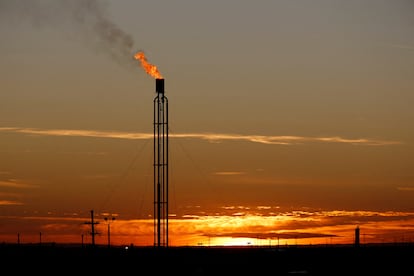A report places Spain’s Repsol among the 50 largest global emitters of CO₂ in the last 170 years
122 companies and entities are responsible for 72% of all the carbon dioxide emitted by the fossil and cement sector since the beginning of the Industrial Revolution


A report by the British research center InfluenceMap has tracked the contribution to climate change of the world’s large fossil fuel producers and cement companies, both public and private. And it points to 122 large entities as responsible for 72% of global fossil fuel and cement CO₂ emissions since 1751. For their study, they took into account the CO₂ expelled directly (linked to the extraction and manufacturing process) and indirectly (from products they sell when they are burned to generate energy). Carbon dioxide is the gas that is most responsible for the planet’s global warming.
The study places entities into three categories: investor-owned companies, state-owned companies and nation states. The period under review stretched from 1854 to 2022. Researchers found that private companies account for 31% of all emissions tracked by the database, with Chevron, ExxonMobil and BP as the three largest contributors in this category. State companies accounted for another 33% of of the database total, with Saudi Aramco, Gazprom and the National Iranian Oil Company standing out as the main emitters. Nation states account for the remaining 36%, with coal production from China and the former Soviet Union being the largest contributors. In Latin America, Mexico’s Pemex, Venezuela’s PDVSA and Brazil’s Petrobras, all with state capital, stand out. Together they account for 3% of emissions.
Position 50 of the 122 public and private entities is occupied by Repsol, the only Spanish company on the list. “Repsol is one of the largest Carbon Majors [large emitters of carbon dioxide] and has played a relevant role historically,” Emmett Connaire, InfluenceMap analyst and co-author of the report, tells EL PAÍS. “Repsol’s CO₂ emissions are equivalent to 0.23% of the global emissions of fossil fuels and cement” of the 122 entities that were analyzed, he adds. But Connaire also points out that the company “appears to have slightly decreased its fossil fuel production in recent years,” leading to a reduction in the gases it expels. The report attributes to Repsol accumulated emissions of 4,584 million tonnes of CO₂ equivalent since 1964, when it began operating, albeit under a different name. But since 2010, emissions have been reduced by almost 23%, according to the data used for this analysis. Repsol declined to make any statement.
In total, the Carbon Majors database attributes to the 122 producers accumulated emissions of 1.42 trillion tonnes of CO₂ covering 72% of global fossil fuel and cement emissions since the start of the Industrial Revolution in 1751. According to the study, more than 70% of these global emissions can be traced to 78 corporate and state producing entities.
Daan Van Acker, Program Manager at InfluenceMap, highlighted in a statement the importance of this database, the first version of which dates back to 2013. “The Carbon Majors database is a key tool in attributing responsibility for climate change to the fossil fuel producers with the most significant role in driving global CO₂ emissions,” he said. “InfluenceMap’s new analysis shows that this group is not slowing down production, with most entities increasing production after the Paris Agreement. This research provides a crucial link in holding these energy giants to account on the consequences of their activities.”
Sign up for our weekly newsletter to get more English-language news coverage from EL PAÍS USA Edition
Tu suscripción se está usando en otro dispositivo
¿Quieres añadir otro usuario a tu suscripción?
Si continúas leyendo en este dispositivo, no se podrá leer en el otro.
FlechaTu suscripción se está usando en otro dispositivo y solo puedes acceder a EL PAÍS desde un dispositivo a la vez.
Si quieres compartir tu cuenta, cambia tu suscripción a la modalidad Premium, así podrás añadir otro usuario. Cada uno accederá con su propia cuenta de email, lo que os permitirá personalizar vuestra experiencia en EL PAÍS.
¿Tienes una suscripción de empresa? Accede aquí para contratar más cuentas.
En el caso de no saber quién está usando tu cuenta, te recomendamos cambiar tu contraseña aquí.
Si decides continuar compartiendo tu cuenta, este mensaje se mostrará en tu dispositivo y en el de la otra persona que está usando tu cuenta de forma indefinida, afectando a tu experiencia de lectura. Puedes consultar aquí los términos y condiciones de la suscripción digital.








































